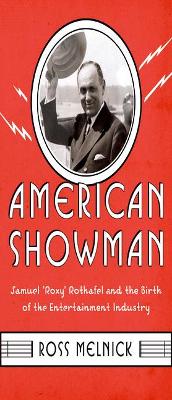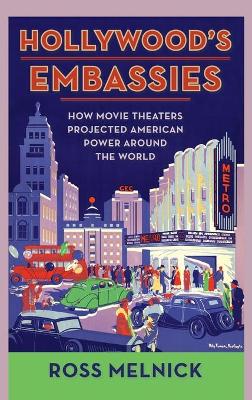Film and Culture
2 total works
Samuel "Roxy" Rothafel (1882-1936) built an influential and prolific career as film exhibitor, stage producer, radio broadcaster, musical arranger, theater manager, war propagandist, and international celebrity. He helped engineer the integration of film, music, and live performance in silent film exhibition; scored early Fox Movietone films such as Sunrise (1927); pioneered the convergence of film, broadcasting, and music publishing and recording in the 1920s; and helped movies and moviegoing become the dominant form of mass entertainment between the world wars. The first book devoted to Rothafel's multifaceted career, American Showman examines his role as the key purveyor of a new film exhibition aesthetic that appropriated legitimate theater, opera, ballet, and classical music to attract multi-class audiences. Roxy scored motion pictures, produced enormous stage shows, managed many of New York's most important movie houses, directed and/or edited propaganda films for the American war effort, produced short and feature-length films, exhibited foreign, documentary, independent, and avant-garde motion pictures, and expanded the conception of mainstream, commercial cinema.
He was also one of the chief creators of the radio variety program, pioneering radio broadcasting, promotions, and tours. The producers and promoters of distinct themes and styles, showmen like Roxy profoundly remade the moviegoing experience, turning the deluxe motion picture theater into a venue for exhibiting and producing live and recorded entertainment. Roxy's interest in media convergence also reflects a larger moment in which the entertainment industry began to create brands and franchises, exploit them through content release "events," and give rise to feature films, soundtracks, broadcasts, live performances, and related consumer products. Regularly cited as one of the twelve most important figures in the film and radio industries, Roxy was instrumental to the development of film exhibition and commercial broadcasting, musical accompaniment, and a new, convergent entertainment industry.
He was also one of the chief creators of the radio variety program, pioneering radio broadcasting, promotions, and tours. The producers and promoters of distinct themes and styles, showmen like Roxy profoundly remade the moviegoing experience, turning the deluxe motion picture theater into a venue for exhibiting and producing live and recorded entertainment. Roxy's interest in media convergence also reflects a larger moment in which the entertainment industry began to create brands and franchises, exploit them through content release "events," and give rise to feature films, soundtracks, broadcasts, live performances, and related consumer products. Regularly cited as one of the twelve most important figures in the film and radio industries, Roxy was instrumental to the development of film exhibition and commercial broadcasting, musical accompaniment, and a new, convergent entertainment industry.
Beginning in the 1920s, audiences around the globe were seduced not only by Hollywood films but also by lavish movie theaters that were owned and operated by the major American film companies. These theaters aimed to provide a quintessentially “American” experience. Outfitted with American technology and accoutrements, they allowed local audiences to watch American films in an American-owned cinema in a distinctly American way.
In a history that stretches from Buenos Aires and Tokyo to Johannesburg and Cairo, Ross Melnick considers these movie houses as cultural embassies. He examines how the exhibition of Hollywood films became a constant flow of political and consumerist messaging, selling American ideas, products, and power, especially during fractious eras. Melnick demonstrates that while Hollywood’s marketing of luxury and consumption often struck a chord with local audiences, it was also frequently tone-deaf to new social, cultural, racial, and political movements. He argues that the story of Hollywood’s global cinemas is not a simple narrative of cultural and industrial indoctrination and colonization. Instead, it is one of negotiation, booms and busts, successes and failures, adoptions and rejections, and a precursor to later conflicts over the spread of American consumer culture. A truly global account, Hollywood’s Embassies shows how the entanglement of worldwide movie theaters with American empire offers a new way of understanding film history and the history of U.S. soft power.
In a history that stretches from Buenos Aires and Tokyo to Johannesburg and Cairo, Ross Melnick considers these movie houses as cultural embassies. He examines how the exhibition of Hollywood films became a constant flow of political and consumerist messaging, selling American ideas, products, and power, especially during fractious eras. Melnick demonstrates that while Hollywood’s marketing of luxury and consumption often struck a chord with local audiences, it was also frequently tone-deaf to new social, cultural, racial, and political movements. He argues that the story of Hollywood’s global cinemas is not a simple narrative of cultural and industrial indoctrination and colonization. Instead, it is one of negotiation, booms and busts, successes and failures, adoptions and rejections, and a precursor to later conflicts over the spread of American consumer culture. A truly global account, Hollywood’s Embassies shows how the entanglement of worldwide movie theaters with American empire offers a new way of understanding film history and the history of U.S. soft power.

